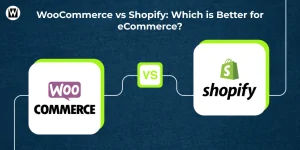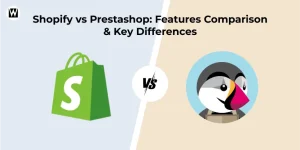BigCommerce vs Shopify: Pick the Right eCommerce Platform For Your Store
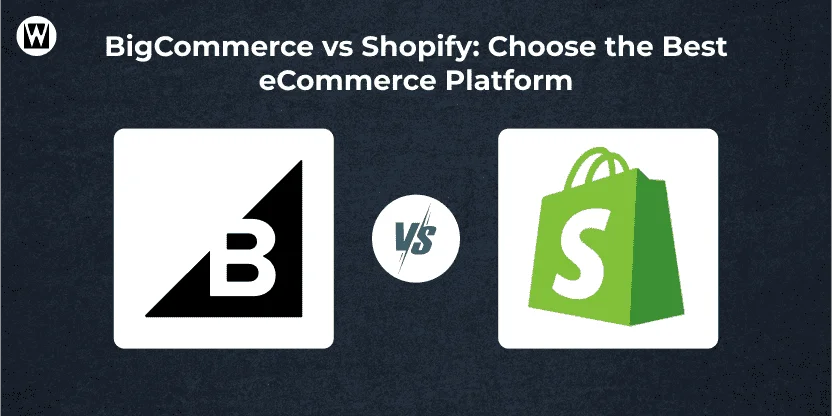
Like a strong foundation is required to build a house, a robust and scalable eCommerce platform can either make or break your online business, therefore, you should choose from popular platforms, such as BigCommerce vs Shopify, to ensure the best performance.
Understanding the difference between BigCommerce and Shopify is important in making the right choice for your eCommerce business. So, in this blog, we will offer a detailed comparison of all aspects of BigCommerce vs.Shopify.
Both platforms offer pros and cons that make them suitable rivals. This raises the question of which one will ultimately fulfill the business objectives.
Now, let’s get ready to rumble as we introduce you to the big leagues of eCommerce, BigCommerce vs. Shopify!
BigCommerce at a Glance
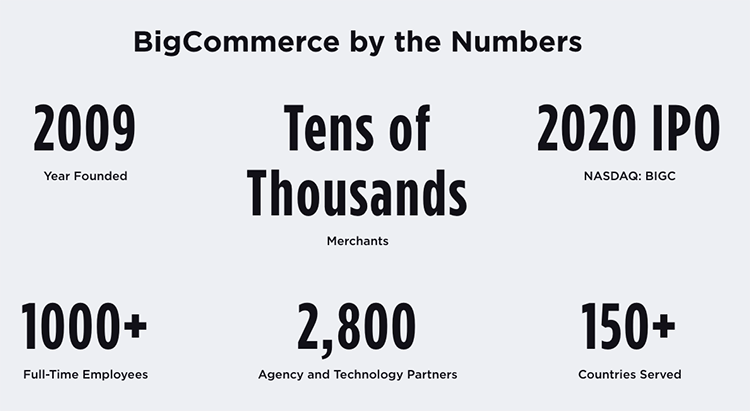
To put it simply, BigCommerce is a well-known and robust eCommerce platform that helps companies of all sizes create and run their online stores.
Yes, your thoughts are on the right track. Why use BigCommerce when there are so many other eCommerce platforms available?
BigCommerce offers businesses several benefits. For those looking for an eCommerce platform, its extensive features, customization choices, user-friendly interface, and first-rate customer service make it an appealing choice among entrepreneurs.
More businesses are inclined toward BigCommerce’s benefits and are becoming interested in the exciting growth of the online store.
Shopify at a Glance
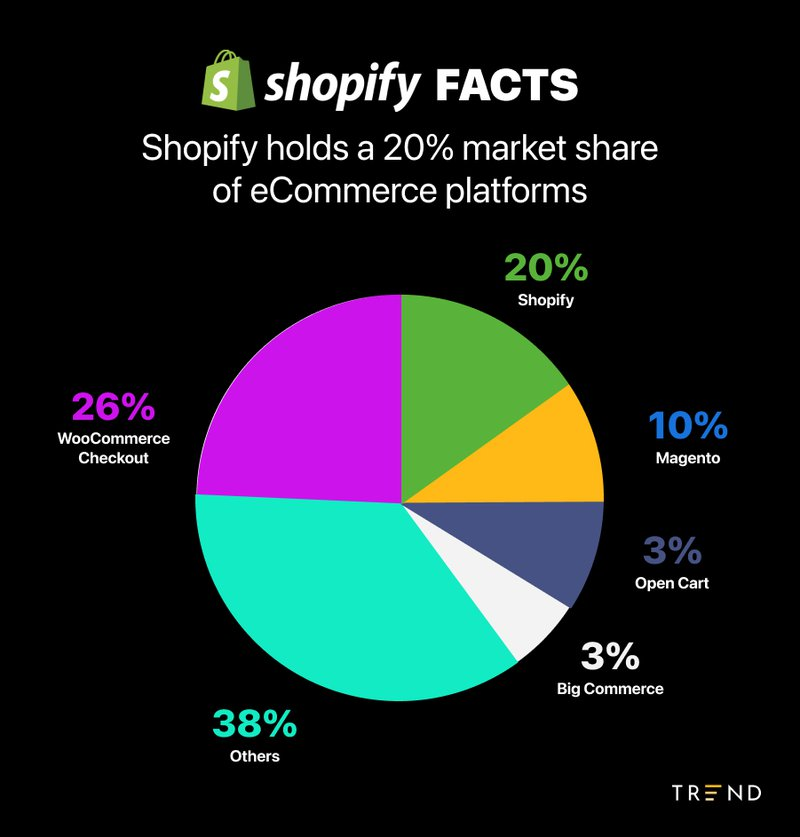
Source: Trend.io
Shopify is one of the popular subscription-based eCommerce platforms that allows online store owners to sell products or services online without any strong technical knowledge. It was created and launched in 2006.
Shopify is more user-friendly than BigCommerce.
For instance, Shopify’s Theme Editor provides a drag-and-drop function.
This tool allows you to add, remove, and move around sections from your home page with only a few clicks.
However, despite its ease of use, Shopify is a powerful platform, which is why many well-known brands choose it over other eCommerce platforms.
- At present, Shopify boasts more than 2,460,005 live stores.
- 39.4% of store owners across the USA use Shopify.
- Shopify Plus, the most expensive and feature-rich package offered by Shopify, is used by many of the largest retailers. 33,767 Shopify domains are currently using Shopify Plus.
BigCommerce vs. Shopify: How They Compare Across 7 Categories
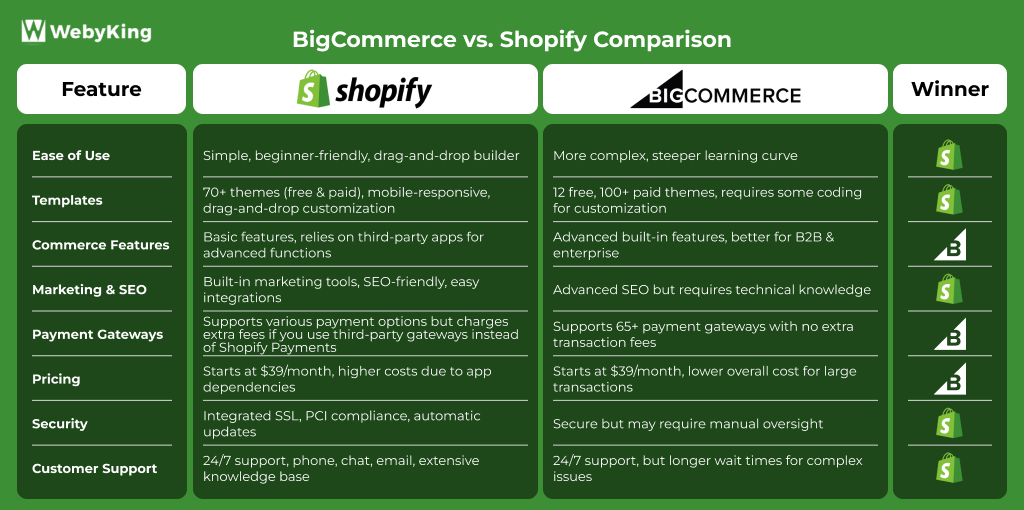
When it comes to building an online store, BigCommerce and Shopify are two of the most powerful platforms available. Both offer a comprehensive set of features to help businesses thrive in the eCommerce world, but there are key differences that set them apart.
Choosing the right platform for your business depends on several factors, such as ease of use, design flexibility, and specific business needs. Which one is better suited to help you launch and scale your online store?
Let’s break down both platforms across seven important parameters to help you make an informed decision.
Ease of Use
Shopify
- When it comes to the platform’s simplicity, Shopify is often cited as much easier for users to use.
- Shopify’s flat, easy-to-navigate user interface helps users effortlessly access the platform. The system is designed so that you can create and manage your store without software knowledge; it provides everything you need, from writing a product description to organizing a customer and writing a blog.
- Newbies can build a store easily by using drag and drop without learning how to code.
- The store dashboard on Shopify is clear and simple so that business owners can easily manage orders, create new products, and adjust the inventory as needed.
BigCommerce
- On the contrary, BigCommerce has a more thorough set of features, but it is much harder to learn.
- Its interface is very complex and hence can not be user-friendly for beginners in most case scenarios, especially if you are not a techie
- BigCommerce’s versatility is the primary reason behind all its features.
- However, it is highly complex, and if a new user does not understand it quickly, it can be time-consuming, especially without access to experienced BigCommerce development services.
Winner: Shopify
Best Online Store Templates
Shopify
- Shopify offers more than 70 professionally designed themes (some are free, some you must pay for), each covering almost all fields.
- They are designed to be mobile-responsive, which means that your store will look good no matter which device you use to access it.
- Beyond that, they have a drag-and-drop page builder that you can tailor to your own needs to build the website you need to match your needs.
- Another marketplace allows Shopify users to choose from a variety of third-party design templates. So almost everyone will be able to find a perfect one.
BigCommerce
- On the contrary, BigCommerce offers only 12 free templates, but it offers more than 100 paid themes.
- Nevertheless, BigCommerce’s templates are responsive; even though they are, they are not as versatile as Shopify’s ones.
- Whereas BigCommerce provides customization features, they might require some knowledge of HTML or CSS, which is probably why it is a top choice for those who are more hands-off.
Winner: Shopify
Business and Commerce Features
Shopify
- Shopify is also feature-rich, but its most powerful capabilities often require third-party apps or integrations.
- While it has excellent out-of-the-box features, BigCommerce’s flexibility and advanced functionality in areas like complex pricing rules, product options, and inventory management make it the best choice for larger or more complex businesses.
BigCommerce
- When it comes to business and commerce features, BigCommerce truly shines. The platform provides a wide range of built-in features for businesses looking for advanced capabilities.
- For instance, it offers tools like customer segmentation, multi-channel selling, abandoned cart recovery, and real-time shipping quotes.
- Additionally, BigCommerce supports advanced features for B2B businesses, such as bulk pricing, custom quotes, and client-specific catalogs.
Winner: BigCommerce
Marketing and SEO
Shopify
- Shopify is the clear winner in marketing and SEO. It offers a wide range of built-in tools to help users market their stores effectively, including email marketing integrations, SEO -friendly features, and easy social media integrations.
- Shopify can integrate with popular email marketing services like MailChimp or Klaviyo. It also offers extensive SEO capabilities, such as customizable title tags, meta descriptions, and URL structures.
BigCommerce
- BigCommerce, while offering SEO features, requires more technical knowledge to optimize effectively.
- The platform supports advanced SEO tools like automatic XML sitemaps and customizable URL structures.
- Still, overall, Shopify’s ease of use and built-in marketing features give it an edge for users looking for a simple, effective marketing solution.
Winner: Shopify
Payment Gateways
Shopify
- Shopify supports various payment gateways, but you will incur transaction fees if you use third-party gateways instead of Shopify Payments.
- Shopify Payments, however, is available in many countries, and the integration is seamless for store owners.
- These fees can add up for merchants using external gateways, making it more expensive for larger businesses or international sales.
BigCommerce
- BigCommerce offers significant flexibility regarding payment gateways. It allows you to integrate with more than 65 payment gateways (without additional fees), including popular options like PayPal, Stripe, and Authorize.net.
- For international merchants, BigCommerce supports multiple currencies and allows for multi-currency checkouts.
- It also provides advanced fraud protection features, making it an appealing choice for businesses with complex payment needs.
Winner: BigCommerce
Pricing
| Particulars | Shopify Pricing | BigCommerce Pricing | |
|---|---|---|---|
| Beginner’s plan | $39 per month | $39 per month | |
|
$368 | $348 | |
| Fees | For the Basic plan: – Online standard card rates: 2.9% + 30¢ – Online premium card rates: 3.5% + 30¢ – In-person credit/debit transaction rates: 2.6% + 10 | For the Standard plan: – 2.59% + $0.49per credit/debit card transaction – 3.49% + 49¢ per PayPal Digital Payments transaction |
(Source: Omnisend )
Cost-wise, there isn’t much of a difference between Shopify and BigCommerce pricing plans.
With the exception of the yearly fee, which is marginally lower for BigCommerce, both have monthly starting rates of $39.
At first glance, Shopify’s price might seem similar to BigCommerce, but the need for numerous app integrations would raise the overall cost.
Overall, BigCommerce’s competitive transaction rates and marginally cheaper annual subscription charges can result in cost savings, even though Shopify and BigCommerce have comparable monthly subscription pricing. This is particularly valid in the event that you are managing a large number of transactions.
Security
Shopify
- Both platforms take security seriously, offering SSL certificates (for encrypted transactions) and PCI compliance (to ensure that credit card information is handled securely).
- However, Shopify has an edge in this category because it integrates security features more seamlessly into its platform.
- Shopify offers 24/7 monitoring and automated security updates, ensuring the platform is up to date with the latest security protocols.
BigCommerce
- BigCommerce also provides a secure environment, but implementing certain security updates may require more manual oversight in some instances.
- Additionally, BigCommerce users must ensure their security practices in cases of advanced customizations.
Winner: Shopify
Customer Support
Shopify
- Shopify is known for its excellent customer support, which is available 24/7 via phone, email, and live chat.
- The support team is highly responsive and knowledgeable, helping merchants resolve issues quickly.
- Additionally, Shopify has a vast resource library, including video tutorials, community forums, and troubleshooting guides, which make it easy for users to find solutions to common problems on their own.
BigCommerce
- BigCommerce also offers round-the-clock support through multiple channels, but users report longer wait times for more complex issues.
- While BigCommerce has helpful documentation and support resources, Shopify’s customer support system and more extensive knowledge base make it a more reliable choice in this area.
Winner: Shopify
BigCommerce or Shopify: Tips to Help You Choose
When deciding between BigCommerce and Shopify, consider your business needs, goals, and technical expertise. Both platforms are excellent for eCommerce, but they serve different types of businesses more effectively.
BigCommerce is known for being feature-rich and scalable, making it ideal for growing businesses or those with more complex product catalogs.
Shopify, on the other hand, is known for its easy setup, vast app ecosystem, and powerful marketing tools. These features make it a popular choice for smaller businesses or those looking for a quick setup.
Choose BigCommerce if,
Choose Shopify if,
|
Ultimately, as the old saying goes, “The right tool for the right job”.
Choose BigCommerce if you prioritize scalability and customization, or opt for Shopify if you prioritize simplicity and speed.
According to a report by Statista, Shopify has more than 5.17 million active stores globally, and BigCommerce serves more than 60,000 merchants. Your choice should depend on where you see your business in the coming years and what features matter most to you today.
Keep in mind that what works best for your friend’s business may not necessarily be the best for yours, so tailor your decision to your unique goals.
Conclusion
As global eCommerce sales continue to skyrocket, with projections showing more than $7 trillion in global BigCommerce sales by 2026, choosing the right eCommerce platform has never been more important. Both BigCommerce and Shopify offer excellent features, but they cater to different types of businesses.
This breakdown has helped you clarify which platform is best for your eCommerce needs. Whether you choose BigCommerce or Shopify, both can power a successful online store.
If you need help with BigCommerce development or Shopify development, don’t hesitate to contact us. We are here to support you in building your dream online store and scaling it to new heights.
FAQs
Which one is better: BigCommerce or Shopify?
Each platform is beneficial. BigCommerce is a good option for businesses that want advanced features, scalability, and extensive product catalogs.
Similarly, Shopify is the best platform for smaller businesses or entrepreneurs who want a quick, simple, user-friendly setup with many third-party apps.
Can you migrate from Shopify to BigCommerce or the other way around?
Yes, website or store migration is possible. A site that requires extensive technical knowledge can be transferred to the new platform using tools and services offered to businesses to move products, orders, and customer data between these two platforms.
However, it is best to get advice from a skilled website migration expert to ensure a smooth transition.
How do BigCommerce and Shopify pricing compare?
Shopify’s pricing starts at $39/month, while BigCommerce offers plans starting at $39.95/month. BigCommerce’s higher-tier plans include more built-in features, while Shopify’s flexibility with apps and add-ons may result in higher costs depending on your needs.
Is BigCommerce good for small businesses?
Yes, BigCommerce is suitable for small businesses, but it’s best for those expecting rapid growth or with complex needs.
Whether you’re upgrading technology, improving performance, or rebranding your business, this checklist ensures a smooth and successful migration every step of the way. Get Your Free Checklist Now!

Ravi Makhija, the visionary Founder and CEO of WebyKing, is a seasoned digital marketing strategist and web technology expert with over a decade of experience. Under his leadership, WebyKing has evolved into a premier full service web and marketing agency, delivering innovative solutions that drive online success. Ravi’s deep understanding of the digital landscape combined with his passion for cutting-edge technologies empowers him to consistently exceed client expectations and deliver results that matter.


